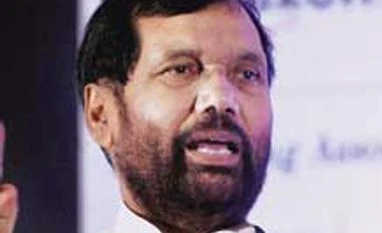Paswan's request comes in the wake of reports that price of pulses - mainly arhar and moong - might once again flare up in 2016 because of little improvement in domestic production as compared to 2015.
Officials said pulses production in 2015-16 (July-June) is expected to be much below the earlier estimate of around 18 million tonnes because of poor sowing of rabi crops, mainly masur. Production in 2014-15 was 17.38 mt almost 10 per cent less than the year before.
More From This Section
The missive comes days after the Union Cabinet cleared a proposal to import around 10,000 tonnes of pulses over the next few months.
"We have written to the commerce ministry to draw up an immediate plan for timely import of pulses because this year also the kharif crop has not been very encouraging due to successive drought," Paswan told reporters.
Pulses prices in the retail markets had crossed Rs 200 per kg in October due to a fall in domestic output. Although retail prices of pulses have cooled down from on account of the government's intervention, rates still rule high at Rs 170-180 per kg.
"If effective steps are not taken now, it is likely that pulses demand far exceeds the supply leading to rise in prices of pulses," Paswan said in the letter.
Paswan asked the commerce ministry to direct public trading firms like MMTC and STC to undertake import of pulses and also intimate the agriculture ministry to make available sufficient funds from the Price Stabilisation Fund (PSF).
The imported pulses would also help in building the buffer stock, which the government has decided to create using PSF to ensure effective intervention at appropriate time to keep prices under control in the domestic market, he added.
For timely import, Paswan said the agriculture ministry should come out with production and demand estimates well in advance.
"This issue is being discussed with the concerned ministries and even at the PMO," he added.
On progress made in creating buffer stock of pulses, the minister said state-run Food Corporation of India (FCI) has started procurement of tur dal directly from farmers in Andhra Pradesh and Telangana.
"About 1,780 quintals of tur has been purchased in these two states. Tur is being purchased at Rs 87 per kg from farmers," he said.
Besides FCI, the government has asked cooperative Nafed and SFAC to procure 1.5 lakh tonnes of pulses in the 2015-16 crop year that will be used to check spurts in retail rates.
India is the world's largest producer of pulses, but still has to import four-five million tonnes to meet its growing domestic demand. The country imported 2.23 million tonnes of pulses in the first half of 2015-16.
To bring clarity on labeling of food items to help consumers take informed decision, Paswan said labels printed on food items should carry only 'expiry date' and not "best before", which has no meaning.
"There is no meaning to print 'best before' on labels of food items. We have written to the Food Safety and Standards Authority (FSSAI) to ensure there are two things clearly printed on the label: date of manufacturing and expiry date," he said.
National Consumer Disputes Redressal Commission President D K Jain had said last week that consumers get confused about labels printed on food items and the FSSAI should look into labelling issues related to 'expiry date' and 'best before'.
Jain had wondered if 'best before' label meant it was fit for human consumption after six months.
Paswan also said the Centre was in discussion with the National Association of Street Vendors of India on earmarking certain areas in cities for selling of such goods.
"We want a system... We want this activity to take place in particular places," he said.
)